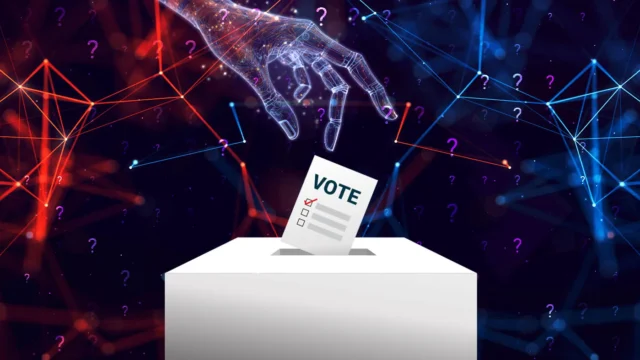
As the 2024 U.S. Presidential Election draws closer, the specter of deepfake AI content looms large, posing unprecedented challenges to electoral integrity and democratic discourse. Deepfake technology, which can generate convincing fake videos and audio recordings, is at the center of a growing debate about the future of political campaigning, misinformation, and the need for robust regulatory responses.
Key Highlights:
- The explosion in deepfake technology raises concerns about the potential for mass misinformation.
- Leading tech companies and political entities are grappling with the implications for election security.
- Legislation and technological solutions, such as content credentials, are being explored to combat the misuse of AI in elections.
- The democratization of AI tools has made powerful technologies accessible to a wider array of users, further complicating the fight against fake content.
The Growing Deepfake Threat
Deepfake AI content, capable of altering the fabric of reality in the digital realm, has surged as a tool for creating hyper-realistic but entirely fabricated images, videos, and audio recordings. This technology poses a significant threat to the integrity of elections by enabling the creation of convincing disinformation campaigns designed to manipulate voter perceptions and undermine trust in democratic institutions.
Industry and Political Responses
The response to the deepfake challenge has been multifaceted. On one side, industry leaders like OpenAI, Adobe, and Microsoft have taken proactive steps to implement safeguards against the misuse of their generative AI technologies. These include restrictions on the creation of political content and the development of content credential systems to verify the authenticity of digital content. On the political front, there are calls for immediate policy reforms to mandate the disclosure of AI-generated content in political campaigns. Legislators, recognizing the urgency of the situation, have begun to push for laws that would prohibit the use of generative AI to create deceptive political ads.
The Challenge of Regulation and Enforcement
Despite these efforts, the fast-paced evolution of AI technology and the ease of access to deepfake generation tools pose significant challenges to regulatory and enforcement efforts. Gaps in the guardrails set by tech companies, combined with the vast potential for misuse by political operatives and individual actors alike, underscore the complexity of safeguarding elections against AI-generated disinformation.
Education and Awareness as Key Defenses
Amidst the technological and legislative battles, the importance of public education and digital literacy has emerged as a crucial line of defense. By equipping voters with the skills to critically assess and question the authenticity of digital content, society can bolster its resilience against the corrosive effects of misinformation. However, even the most sophisticated digital natives are not immune to the persuasive power of well-crafted deepfakes, highlighting the need for ongoing vigilance and adaptive solutions.
As the 2024 election approaches, the struggle against deepfake AI content will test the resilience of democratic institutions and the collective will of the electorate to defend the integrity of the political process. The outcome of this struggle will have far-reaching implications for the future of democracy in the digital age, underscoring the need for a coordinated and comprehensive approach to address the multifaceted challenges posed by generative AI.
This article draws on information from IEEE Spectrum, Reuters, blogs at Elon University, and The Thinking Conservative, providing a broad overview of the current landscape of deepfake AI technology and its potential impact on the upcoming U.S. Presidential Election.










